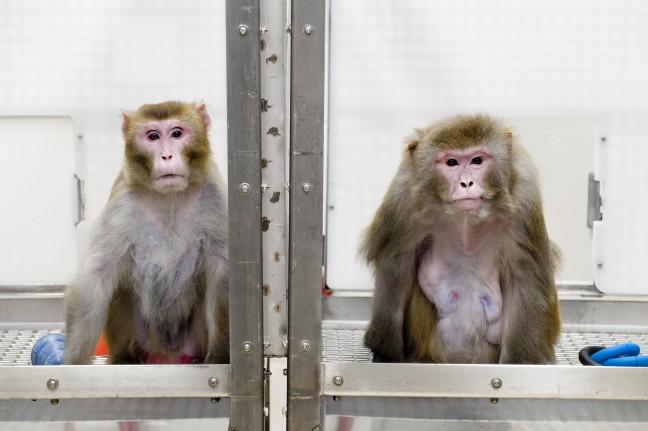The University of Wisconsin responded to claims made by an animal rights organization that had an undercover worker in UW’s animal research facility for seven months.
People for the Ethical Treatment of Animals filed one complaint with the U.S. Department of Agriculture and another complaint with the National Institutes of Health on Sept. 2.
A PETA investigator worked undercover at UW’s Wisconsin National Primate Research Center from March to September 2020, obtaining footage and information on the program, according to PETA’s complaints.
According to the USDA, guidelines under the Animal Welfare Act protect monkeys used for research. In their complaints, PETA alleges violations of the AWA in the WNPRC such as inadequate veterinary care, failure to reduce discomfort and pain in animals and inadequate instruction to workers.
UW research provides alternative approach to flu, COVID-19 vaccine development
UW has received fines for violating the AWA within their animal research labs before. In 2014, the USDA fined UW more than $35,000, in part for incidents involving animal welfare and facility upkeep, according to a UW statement.
Additionally, in April 2020, the USDA fined UW $74,000 for 28 violations of the AWA, many of which were monkey-related, according to the USDA citation.
PETA also released photos and a four-minute video containing footage from the investigator on their website. PETA said in these posts that monkeys in the WNPRC experienced stress, confinement and separation between mothers and babies.
UW released a statement titled “PETA misrepresents UW–Madison lab” in response to PETA’s claims and video.
“Episodes plucked out of context from years of notes on about 100 of the roughly 1,600 animals in the facility can be reframed to fit PETA’s agenda,” UW said in their statement.
UW Health focuses on improving diversity in COVID-19 vaccine clinical trials
UW said in the statement their animal care and research staff take their roles seriously, balancing the responsibilities it has to people and animals.
Those working and researching in labs must follow guidelines from federal agencies such as the NIH and USDA, UW said in the statement.
“Researchers are driven by hope that science can help improve lives, by the curiosity that guides new discoveries, and by the bright future they see as they train the next generation of scientists,” UW said in their statement.
PETA Vice President of Laboratory Investigations Alka Chandna said their organization has had concerns about how the WNPRC treats its animals since PETA started in 1980. Chandna said they wanted to do the undercover investigation to find out what was going on at the WNPRC.
UW temporarily suspends in-person research in response to recent directive from Chancellor
Chandna oversaw the investigation as it proceeded and said it was clear UW’s facility was failing its monkeys.
“It’s absolutely clear if you look at the monkeys, that they’re in psychological distress,” Chandna said, referring to the investigator’s video footage.
Chandna believes there is no right way to use monkeys for research.
The investigation ended Sept. 1, one day before PETA filed their complaints, Chandna said.
“With this investigation, we’re calling on the University to say ‘enough’ and pull the plug on the primate center,” Chandna said.
Former WNPRC researcher Alex Kuehlmann worked with monkeys at UW for three years. Kuehlmann said the monkeys always came before the research. She said because their research is federally funded by the NIH, they must follow strict animal care guidelines.
“Every decision is geared towards the betterment of the animals,” Kuehlmann said.
There is a 24-hour husbandry staff that watches the monkeys closely, Kuehlmann said. If a monkey exhibits health or mood problems, the husbandry staff makes changes and takes special care of that monkey.
Kuehlmann said when she brought her mother to the facility, her mother noticed the monkeys were much different from those at the zoo, pointing out their playfulness and positivity.
UW researchers work to develop faster saliva test for COVID-19
“There’s been some really groundbreaking research that has been done at UW that would not be there without the primate center,” Kuehlmann said.
Kuehlmann said research with monkeys is insightful because unlike some other research animals, monkeys have behaviors and structures similar to humans.
UW Associate Vice Chancellor for Research Policy and Compliance Nadine Connor said in an email to The Badger Herald that PETA created their video and campaign to cast a negative light on the treatment of research animals.
“What those videos don’t show, is how the animals are treated humanely and with great care, nor how science and scientists have advanced medicine, knowledge and treatment of disease,” Connor said.
UW scientists have researched animals for more than 100 years, according to UW’s website. Connor said monkey research is playing an important role in finding a vaccine for COVID-19.
UW said in their statement they will comply with any investigations by the NIH and the USDA.
Investigations are now underway, according to a PETA news release.














